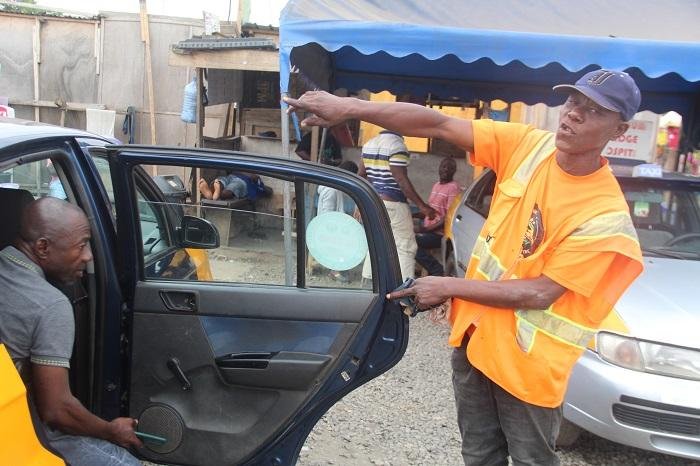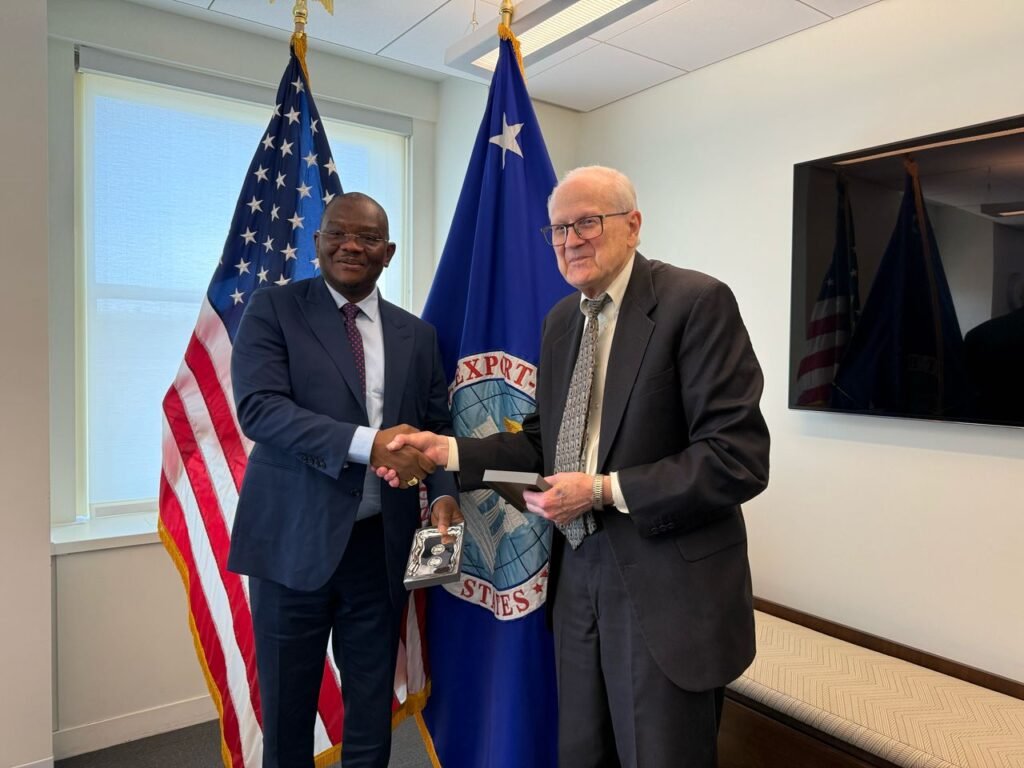Hot!
Rise in unregulated world of Accra’s ‘shadow boys’

A popular loading boy at the Odawna trotro station happily going about his work
Amidst the chaos of honking cars and shouting bus conductors at various bus terminals in Accra, these group of young men who call themselves ‘shadow boys’ can be seen darting between vehicles, while directing potential commuters to commercial buses for transport.
The story of the ‘shadow boys’ is one of resilience in the face of increasing unemployment and also, a testament to the struggling but evolving transportation system in Ghana.

According to a 2023 report from Trading Economics, Ghana’s unemployment rate has risen to 3.6 per cent, with indications of rising further at the end of 2024.
Although this number may seem modest compared to other African countries, the reality is that many young people like the ‘shadow boys’ are forced to take up unconventional jobs to survive amidst rising cost of living in the country.
The lack of limited jobs and opportunities has led to a surge in unconventional occupations, with ‘shadow boys’ being a prime example.
In recent times, they have increased significantly in number and can be seen at almost every bus terminal and loading station in Accra; where they abound and go about their daily operations. Although an unconventional job, ‘shadow boys’ depend on this work for their daily survival. Their job can be described as a hand-to-mouth work because generally, they struggle to get reasonable profit for their labour.
Currently, they receive a commission which ranges from GHȻ5 to GHȻ10 per each bus they fill. This price is however subject to change depending on the number of passengers, they are able to bring for each bus. On good days, they can make up to GHȻ150 but on normal days, they settle with a paltry GhȻ50.
Kwame Foster, is a 29-year-old ‘shadow boy’ at Circle. According to him, their job description is to help official bus conductors get passengers for their commercial vehicles, commonly referred to as ‘trotro’ in Ghana.
Kwame, who has been in this business since 2007 after he got injured as a bus conductor, said he chose to become a ‘Shadow Boys’ because he could not get another decent job to make ends meet. Kwame’s story is a reflection of the lives of many others who joined the business due to lack of alternative job prospects.
The life of ‘shadow boys’ is considerably difficult. They face numerous challenges including physical danger, harassment, unpredictable income and social stigma. Many people see them as nuisances and criminals, rather than hardworking individuals.
Faced with unpredictable income, their earnings vary greatly, with some days yielding nothing significant. The lack of recognition and regulation also exposes them to exploitation and abuse. Despite these struggles, the ‘shadow boys’ persevere, driven by the need to support themselves and their families.
Though informal, ‘shadow boys’ have become a third wheel in the transportation ecosystem. In areas like Madina, Circle, and other major transport hubs, they have become an integral part of the system, as daily they energetically solicit passengers for commercial transport vehicles.
Aside this and their work being a source of livelihood for them, they have also made easier the work of bus conductors. In essence, they contribute to the overall efficiency of the transport system by reducing the stress and uncertainty associated with finding the right vehicle for transit and ensuring that vehicles were fully occupied-thus reducing the number of empty vehicles on the road.
However, their methods have also been criticised for being overly aggressive and exploitative. Some drivers have reported being forced to pay exorbitant fees, with threats of violence or damage to their vehicles if they refuse.
Others also described instances where they refused services of ‘shadow boys’ who still insisted on being paid after getting passengers for the car. This raises concerns about the lack of regulation and oversight in the industry.
Their services may seem invaluable but general concerns surrounding their practices have sparked debate and raised questions about the legal framework governing their activities.
Ghanaian law does not specifically address the activities of ‘shadow boys.’ However, the Road Traffic Act (2004) and the Transport Ownership and Regulation Act (2015) provide some insight. While these laws primarily focus on vehicle operation and transportation services, they do not explicitly mention the role of intermediaries like ‘shadow boys.’
Again, the Ghana Road Transport Coordinating Council (GRTCC) regulates the transport sector, but its mandate does not extend to the activities of ‘shadow boys.’ Rather, the GRTCC’s focus lies in ensuring compliance with safety standards, vehicle maintenance, and fare regulation.
In the absence of specific legislation, ‘shadow boys’ operate in a legal gray area. Their services, though valuable to some, are often characterised by unregulated pricing and strong-arm tactics due to the absence of regulation for their service.
This, has led to increased calls for regulation and oversight to protect drivers, bus conductors, passengers, and the transport industry as a whole.
Some proposed that ‘shadow boys’ be licensed and registered, with clear guidelines on their fees and conduct. Others suggest that their services be integrated into the formal transport sector, ensuring fair compensation and adherence to established standards.
As Ghana’s transport industry continuous to evolve, the role of ‘shadow boys’ cannot be ignored. While their unconventional employment provides a means of livelihood, it also highlights the need for comprehensive regulation and protection for all stakeholders involved.
The Ministry of Transport is therefore urged to address the legal vacuum surrounding ‘shadow boys’ by developing policies to regulate their operations.
In conclusion, the activities of ‘shadow boys’ underscores the resourcefulness and adaptability of Ghanaians in the face of economic challenges. However, their activities must be regulated to ensure fairness and protection for all parties involved.
As the transport industry continues to grow, it is essential that policymakers and stakeholders work together to create a framework that acknowledges the contributions of ‘shadow boys’ while promoting a more formalised, efficient and equitable transport system.
University of Media, Arts
and Communication-Institute
of Journalism (UniMAC-IJ)
By Eyram Vordzorgbe
Hot!
GEXIM deepens relations with US EXIM Bank

A management team of the Ghana Export – Import Bank (GEXIM) led by the Acting Chief Executive, Sylvester Mensah met with the leadership of the Export–Import Bank of the United States (US EXIM) on Wednesday April 23, 2025 in Washington DC, United States of America.
The Acting President and Chairman of US EXIM, Mr. James C. Cruse and Vice President, International Relations, Ms. Isabel Galdiz received the GEXIM delegation, which included Deputy CEO for Banking, Mr. Moses Klu Mensah and Head of International Cooperation, Mr. Jonathan Christopher Koney at the headquarters of US EXIM.

The meeting offered the GEXIM team the opportunity to share the strategic direction of the Bank in line with the resetting agenda of the President of the Republic, His Excellency John Dramani Mahama for the repositioning of the Ghanaian economy into an export-led one by providing the requisite investment to Ghanaian businesses.
Mr. James C. Cruse expressed US EXIM’s eagerness to deepen its existing relations with GEXIM and proposed the signing of a new Cooperative Framework Agreement following the expiration of a Memorandum of Understanding signed in 2019 to utilize US EXIM’s medium term loan guarantees to procure machinery by GEXIM for qualified Ghanaian Small and Medium-sized Enterprises (SMEs).
Mr.Sylvester Mensah thanked the Acting President and Chairman of US EXIM for hosting the GEXIM delegation and reaffirmed the Ghanaian government’s commitment to strengthening trade and investment between Ghana and its global partners for economic transformation of Ghana with GEXIM playing a pivotal role.
The two teams will be meeting on the sidelines of the 2025 US EXIM Annual Conference on 29th and April 30, 2025 to explore possible areas of collaboration and matching Ghanaian businesses to American companies. The meeting ended with an exchange of gifts.
Hot!
Many SOEs have been used as mere instruments for personal wealth accumulation –Pres.Mahama

President John Dramani Mahama has expressed concern over the misuse of State-Owned Enterprises (SOEs) for personal financial gain by individuals in leadership positions.
Speaking during a meeting with Chief Executives of specified entities under the State Interest and Governance Authority (SIGA) on Thursday, March 13, the President directly attributed the dire state of SOEs to their leadership, accusing chief executives, management teams, and governing boards of prioritising personal enrichment over organisational efficiency.
He pointed to bloated budgets, unjustified allowances, and unnecessary expenditures as factors draining public funds while SOEs continue to rely on government bailouts.
“Many SOEs have been used as mere instruments for personal wealth accumulation by appointees. The chief executives, management, and boards of these enterprises are responsible for this situation. Some SOEs have become perennial loss-makers, draining public funds with bloated budgets, unjustified allowances, and unnecessary expenditures while relying on government bailouts as if entitled to them. Many of these entities are at their lowest point in the entire history of the Fourth Republic,” he said.
President Mahama further noted that many SOEs have been plagued by inefficiencies, corruption, and mismanagement, leading to consistent financial losses. He cited the 2023 State Ownership Report by the State Interests and Governance Authority (SIGA), which highlighted systemic inefficiencies and wasteful expenditures within these entities.
He therefore reaffirmed his commitment to reforming under-performing SOEs and ensuring they serve national interests.
He warned that loss-making SOEs will no longer be tolerated and will either be merged, privatised, or closed.
“I will assess you based on your performance. If you do not align with the pace of the reset agenda, you may be asked to step aside. If that adds to the horror movie, so be it,” he added.
Source: Myjoyonline.com







